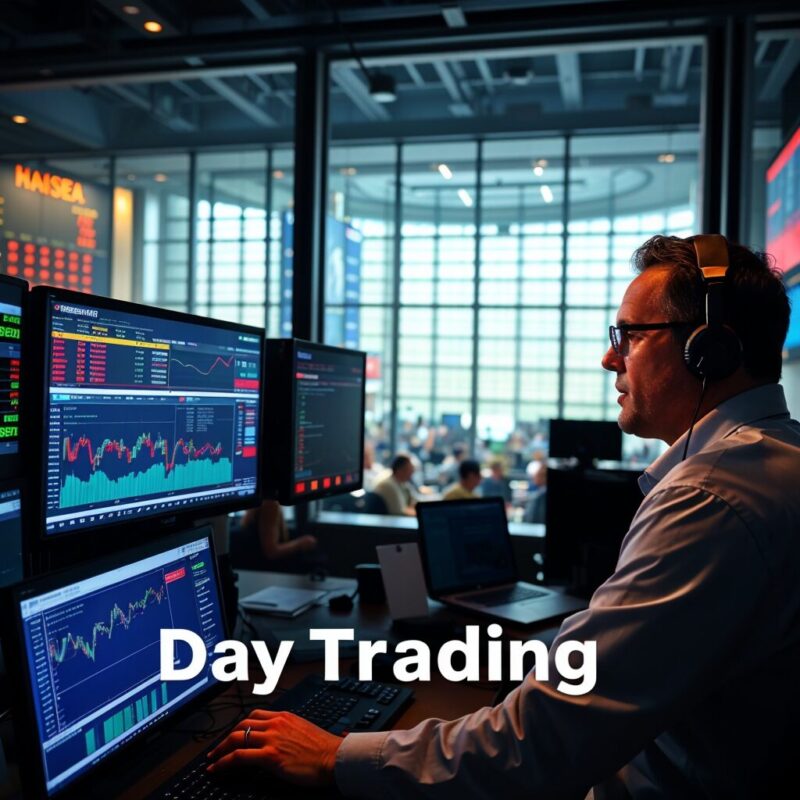Getting started with day trading can feel overwhelming. You’ve probably heard stories of individuals who have made significant money, but also of others who have lost big. It’s a fast-paced endeavor, and preparation is key to avoiding mistakes. To help you navigate the world of day trading, we’ve put together some foundational tips and insights you need to know before jumping in.
Key Points:
- Day trading involves buying and selling financial instruments within the same day.
- It requires knowledge of markets, strategies, and risks.
- Beginners should practice with simulations before using real money.
- Set clear goals and stick to a plan.
- Use educational resources to build your knowledge base.
What is Day Trading?

Day trading means buying and selling stocks, currencies, or other assets within a single day. It is different from long-term investments where people hold onto assets for months or years. The aim is to make quick profits by exploiting small price movements. It requires focus, strategy, and emotional control. You have to act fast and be ready for potential losses.
Some think that day trading is a guaranteed way to get rich quickly. That’s not the case. Success takes time, and mistakes can be costly. Education is key to minimizing risks.
Many beginners start with educational platforms like Warrior Trading, a widely recognized community of active day traders. It offers courses and training programs to help individuals learn effective strategies. It is known for being user-friendly, even for complete beginners.
Understand the Risks Involved
The prices of stocks and other assets fluctuate rapidly. Without the right knowledge, you could easily lose money. You have to be prepared for losses and know that success doesn’t happen overnight. Professionals recommend only investing money you are willing to lose, especially at the start.
Another risk is emotional decision-making. When trades don’t go as planned, many people panic and make hasty decisions. This leads to poor outcomes. You need to stay calm and focused, even in high-pressure situations.
Start Small
Many people want to start big, thinking the larger the investment, the higher the potential return. This isn’t always true. Start small, especially if you are new to the process. Small trades give you room to learn without risking too much money.
The market can change in seconds, so practice caution. Start with lower amounts to understand how the process works. Once you feel more comfortable and confident, you can increase your trading size.
Use Simulations Before Trading with Real Money
Before jumping in with your hard-earned money, use a simulation account to practice. These accounts allow you to trade in real-time but without using real money. This gives you valuable experience and helps you fine-tune your strategy.
Practicing in a simulated environment allows you to learn from mistakes without any real-world consequences. It also gives you an idea of how quickly prices can move and how you’ll need to respond in actual situations.
Have a Clear Plan
You need to decide in advance how much you are willing to invest, what kinds of trades you’ll make, and your goals. Set clear boundaries and stick to them.
Many people fail because they don’t have a plan. They try to trade based on their gut feelings or random tips. Without structure, it’s easy to lose focus and make costly errors.
Choose a Reliable Broker

A broker is a platform that allows you to place trades. Choose one with low fees and reliable execution. You don’t want to deal with issues such as slow processing times or unexpected fees.
Also, consider brokers that offer educational tools for beginners. Some brokers provide resources like tutorials, webinars, or live customer support, which can be helpful for those just starting out.
Manage Your Time Effectively
Day trading takes time. You have to monitor the markets regularly, study charts, and stay updated with financial news. It’s not something you can do effectively in a few minutes a day.
Many beginners underestimate the time commitment needed. If you have a full-time job or other obligations, you might find it difficult to dedicate enough time. Make sure you have enough hours each day to focus on learning and improving your strategy.
Learn About Different Market Orders
There are different types of orders you can place when buying or selling. Market orders and limit orders are two common examples. A market order means you are buying or selling at the current available price. It’s fast but less controlled. A limit order lets you set a specific price you’re willing to pay or accept. It gives you more control but may not get executed if the price doesn’t reach your limit.
Knowing how these work helps you execute trades more effectively.
Stay Informed with News and Market Trends
The market can change rapidly based on news events. Earnings reports, political developments, and economic data releases all impact prices. Stay informed and always check the news before making a trade.
Following trends also helps. Traders often look for patterns in price movements to make informed decisions. Keep an eye on market charts and trends to increase your chances of making successful trades.
Stay Consistent with Your Strategy
Don’t change your strategy every time a trade doesn’t work out. If you believe in your approach, stick to it. Many beginners lose money because they constantly jump from one strategy to another. Patience is crucial.
Study your results and analyze what works and what doesn’t. Adjust if necessary but avoid making sudden changes based on one or two bad trades.
Focus on the Long-Term Process
Success doesn’t happen overnight. You will face losses, but the goal is to learn from them and improve over time. Day trading is a marathon, not a sprint.
Don’t expect immediate results. Instead, focus on gaining experience, learning from your trades, and gradually becoming more proficient. Over time, you will refine your skills and better understand how the market works.
Final Thoughts

Day trading isn’t a get-rich-quick scheme. It takes time, practice, and patience to develop the necessary skills. Start small, practice in simulations, and stay disciplined. With the right approach, you can minimize risks and increase your chances of success over time.








